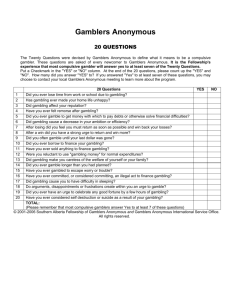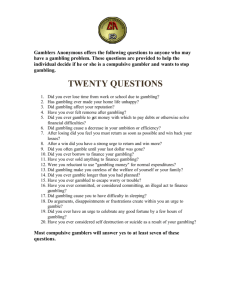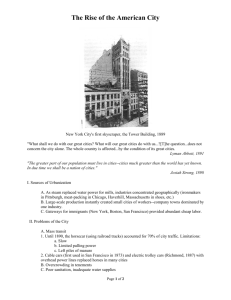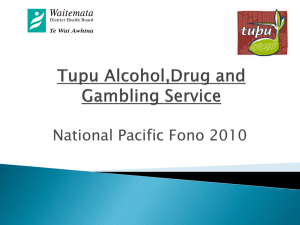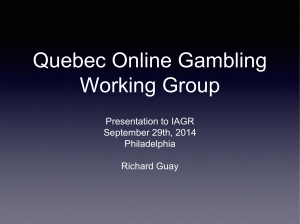Word Doc
advertisement
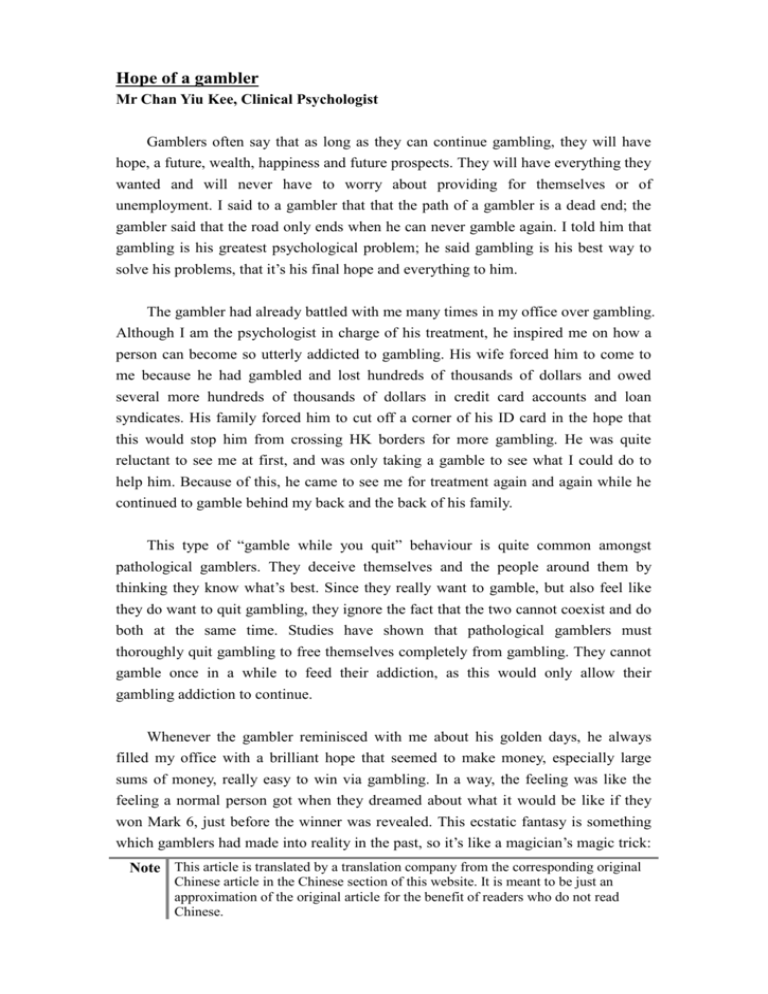
Hope of a gambler Mr Chan Yiu Kee, Clinical Psychologist Gamblers often say that as long as they can continue gambling, they will have hope, a future, wealth, happiness and future prospects. They will have everything they wanted and will never have to worry about providing for themselves or of unemployment. I said to a gambler that that the path of a gambler is a dead end; the gambler said that the road only ends when he can never gamble again. I told him that gambling is his greatest psychological problem; he said gambling is his best way to solve his problems, that it’s his final hope and everything to him. The gambler had already battled with me many times in my office over gambling. Although I am the psychologist in charge of his treatment, he inspired me on how a person can become so utterly addicted to gambling. His wife forced him to come to me because he had gambled and lost hundreds of thousands of dollars and owed several more hundreds of thousands of dollars in credit card accounts and loan syndicates. His family forced him to cut off a corner of his ID card in the hope that this would stop him from crossing HK borders for more gambling. He was quite reluctant to see me at first, and was only taking a gamble to see what I could do to help him. Because of this, he came to see me for treatment again and again while he continued to gamble behind my back and the back of his family. This type of “gamble while you quit” behaviour is quite common amongst pathological gamblers. They deceive themselves and the people around them by thinking they know what’s best. Since they really want to gamble, but also feel like they do want to quit gambling, they ignore the fact that the two cannot coexist and do both at the same time. Studies have shown that pathological gamblers must thoroughly quit gambling to free themselves completely from gambling. They cannot gamble once in a while to feed their addiction, as this would only allow their gambling addiction to continue. Whenever the gambler reminisced with me about his golden days, he always filled my office with a brilliant hope that seemed to make money, especially large sums of money, really easy to win via gambling. In a way, the feeling was like the feeling a normal person got when they dreamed about what it would be like if they won Mark 6, just before the winner was revealed. This ecstatic fantasy is something which gamblers had made into reality in the past, so it’s like a magician’s magic trick: Note This article is translated by a translation company from the corresponding original Chinese article in the Chinese section of this website. It is meant to be just an approximation of the original article for the benefit of readers who do not read Chinese. it seems unbelievable, but it’s so real it’s difficult to not believe it. The magical sensation of winning big bucks is a common theme in the stories of pathological gamblers. The money he won, the temporary excitement and hope he gained and the lack of achievement and joy in his own life were exactly what made him believe he could keep on winning. Although he lost more than he won in the end, he believed he needed to gamble with even bigger stakes to win back the money he lost, and this was especially true when he lost a lot of money. He firmly believed that he would win next time, but since there would always be a next time, he would keep gambling forever to keep alive his expectation of winning big money in the next gamble. If he is forced to stop gambling, he would feel uncomfortable and worry that he was missing out on his big break. The interesting thing is the flipside of this expectation is the depths of despair, so he would keep borrowing money, steal money, or scam people for money so he could keep gambling. According to statistical and probability calculations, the dealer has more gambling capital than a gambler, so if both parties continue gambling, the gambler will lose in the end. Although these mathematical calculations seem quite deep, they are tried and tested on many pathological gamblers who have come in contact with us, regardless of whether they considered themselves to be intelligent or not. As is commonly said, we’re not afraid of whether you are smart of dumb, but the only thing we’re afraid of is that you won’t come to us. When gamblers refuse to give up even when they lose until they are in a state of poverty, they only have one answer in their hearts – that is to keep gambling to pay off their debts because they can’t come up with any other options. Gambling has forced them into ruin, but they are also deeply convinced that they can win enough to make up for everything they lost in the past as long as they can gamble one more time. The root of their gambling problem is deeply entrenched in their hopes of winning money. This self-destructive expectation is related to gamblers’ belief that they have mastered the secret to winning money. To put it bluntly, this secret is nothing more than superstitious mumbling. For example, the belief that they won’t lose money as long as they don’t encounter a monk or a nun on the day they gamble, or that they have seen through the rules of gambling. This narcissistic and close-minded self-deception is completely out of touch with reality. In reality, the result of each gamble is the consequence of random changes which have nothing to do with personal factors and gambling techniques, etc. Note This article is translated by a translation company from the corresponding original Chinese article in the Chinese section of this website. It is meant to be just an approximation of the original article for the benefit of readers who do not read Chinese. The cost of doing battle with the laws of nature is quite costly indeed as gamblers often become extremely frustrated, depressed and hopeless after losing lots of money. They also have to face up to all kinds of creditors, which makes them feel like the shadow of the god of death looms over them, leaving them with no option other than suicide. And if they failed to kill themselves, they would want to gamble again once their gambling addiction hits them once more. They travel back and forth between the line of life and death and win less than they lose. In their lives, they go through a continuous cycle of gain and loss. The ironic thing is that they are ultimately left with extreme pleasure and dismay derived from their gambling addiction. Nothing in their lives is more destructive than this “remarkable” experience. The form of self-destruction that gamblers engage in is slightly different to those who choose to suicide by jumping off a building. Gamblers prefer to draw out the process of self-destruction, extending the period of time they experience their pleasure and involving more people who love them, so that they all suffer together and also engage in self-destruction by helping to pay off their never ending debts. Only after a gambler has survived all of this will he begin to truly accept psychological treatment. At this point, gamblers will return to a position capable of self-analysis and try to analyse and change their pathological mentality with me, so as to gain a rational understanding of the significance of probability, understand various self-deceiving thoughts and self-destructive tendencies, learn to no longer have any fantasies about gambling, and to put their focus back onto themselves and the people and things around them. They will plant their feet back on the ground and live like an ordinary person, and no longer believe they have the ability to win money. They will thoroughly admit defeat and understand that putting their energy back into their work and deriving pleasure from their work and interpersonal relationships is the real victory. While they may no longer win money, they will have saved their own lives and begun to live more practically and more happily. The real hope for gamblers is that they can live to see the future they haven’t gambled away yet. Note This article is translated by a translation company from the corresponding original Chinese article in the Chinese section of this website. It is meant to be just an approximation of the original article for the benefit of readers who do not read Chinese.
